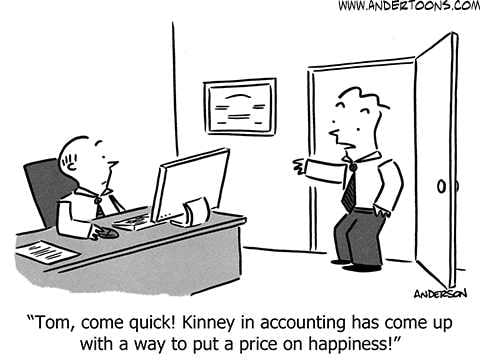
Do you need a succession plan?
a. Yes
b. No
c. Maybe, probably, who knows
d. Meh, don’t bother me, I’m busy
Should an accountant have a role in your succession plan if you decide to implement one?
a. Yes
b. No
c. Maybe, probably, who knows
d. Meh, what does an accountant have to do with who succeeds me
Simply put, succession planning is preparing your company for changes. It’s usually thought of as training individuals to fill leadership roles, but it also includes transferring ownership of your business. It’s a process with both long-term and short-term facets.
Change Happens
You can probably name more than one company that’s no longer in existence because it didn’t adapt to change. Big companies must evolve just as much as small companies do. Markets change. Key employees leave. Regulatory agencies always have new or different rules. Your business goals aren't the same as when you began.
 Unless you have a crystal ball, you can’t know precisely what impending changes, if any, will affect your company. You might see changes coming, but you can't predict their impact. Part of your succession planning involves calculating the probabilities of certain occurrences and how to survive them.
Unless you have a crystal ball, you can’t know precisely what impending changes, if any, will affect your company. You might see changes coming, but you can't predict their impact. Part of your succession planning involves calculating the probabilities of certain occurrences and how to survive them.
Your accountant should already be advising you on succession planning. It’s true that accountants deal with the past when it comes to knowing how your business is doing financially. However, their analyses of patterns of income and expenses serve as an early-warning system of change.
Plan to Protect Your Company
Succession plans must protect the shareholders, especially in small corporations in which you have the controlling interest. Who gets your shares if something unexpected happens to you? If your company isn’t publicly traded, how will your shares be valued? What provisions have you made to keep inheritance taxes from crippling the company’s cash flow? Talk to your accountant.
Do you intend to sell the company, preferably at a profit? Plan early for that also. Your accountant is invaluable is helping you increase the value of the company and selecting the best time to sell.
What Will Happen If You Are Gone?
The larger part of your succession planning will likely be centered on employees. You can always hope for smooth transitions in employee turnover, but you need short-term procedures in place for when the inevitable emergency occurs.
What if you suddenly die? Is there someone who can step up and keep the company viable? If you’re part of a partnership, how will the other partners fill your role, if at all? And what about your heirs? Maybe one or more of them want to replace you. Or perhaps you planned on your heirs taking your place, eventually, but none of them want to. If you’re part of a partnership or small corporation, maybe the partners or other key employees would rather dissolve the company than work with your family members.
Whether you are part of a large corporation or plugging along all by yourself, you need to have “the talk” with everyone ahead of any potential changes, anticipated or otherwise. If you’re running a family business, “the talk” can be especially difficult. If you care about the continuity of the company, you can’t give in to hurt feelings or “we’ll leave it up to you” attitudes. If no family member wants to succeed you, or has the ability to do so, then you will need to have plans in place for either discontinuing business or selling the company.

How important is your role in the company? Does everything depend on you? If so, you can’t start grooming your successor too soon. If your company is large enough to have a human resources department, expect them to have several replacements-in-waiting. Otherwise, it’s all up to you. Family business? It’s back to “the talk” about who is or is not interested in filling your shoes. Whether a family member or an outsider, give your successor adequate opportunity to learn your job.
Accountants Have an Essential Role in Succession Planning
One professional planner has this to say: “Succession planning requires the interaction of multiple professional disciplines including law, accounting, tax, strategic planning, management facilitation, family facilitation, financial planning, wealth management, life insurance, training, operational coaching, mentoring, etc.” It’s not hard to pick out the role of accountants on that team. There are also taxes and estate administration considerations and “Succession planning without the involvement of a qualified accountant is an exercise in futility that will ultimately result in a succession plan cursed by holes, gaps and cracks.”
Sounds like a pretty strong case for including your accountant in your succession planning.
Where do you begin? Start with yourself. Assuming that you do not die young, what are your retirement plans? Will you work for as long as your health and ability permit? Or stop working while you’re still young enough to enjoy retirement? Will you stay on as a part-time consultant? All of your choices affect your personal finances and tax liabilities as well as the company’s financial planning. That’s all more stuff for your accountant.
Who Is Going to Replace You?
In both large and small companies, not planning for who will succeed you or other key employees can prove expensive. According to Forbes, “Inadequate succession planning is probably the single most significant factor leading to outsized executive compensation.” As well as the costs to recruit and compensate an executive, the new hire needs time to master the details of your company. The downtime is costly. Additionally, other members of your team may expect that their compensation packages will be increased to match the newest member.
Now is the time to begin preparing your potential successor. While you’re at it, prepare that person’s successor, and on down the management ladder as appropriate. If your company has a human resources department, turn to them for help. If not, rely on your observations of leadership, job performance, achievements, ability to work with others, and other relevant qualifications of your current managers or high-level staff. If none are suitable, search for someone in lower level positions that qualify for promotion or initiate recruiting from the outside.
Your successor will obviously need leadership skills. Other skills and abilities will depend on what your job is, but keep in mind that the changing business environment means that your successor will likely have to know more than you. Part of your succession planning includes making sure replacements get the training and encouragement they need.
If your company is very small, you may have to rely on cross-training everyone. While that might not necessarily enable someone to immediately step into your position, at least things won’t come to a screeching halt in an emergency.
Overcome Resistance Gradually
You may run into resistance with your planning, particularly in a smaller or family-owned company. Some individuals don’t like to share their knowledge in the belief that job security comes from being the only one able to do that job. Others view any change with fear. Some don’t want to take time from their work to train another person. You may have to deal with a family member who is just plain ornery. Resistance can mean implementing your plan step-by-step as you demonstrate to the nay-sayers that it’s beneficial to them and the company.
A Succession Plan Is A Guide Subject to Review and Revision
Succession planning provides a guide for future hiring decisions as your company expands. It can also point the way to needed changes in the way you do business. Including your accountant before and during the process can prevent adverse financial consequences for you and your company currently and in the future.
The answer to “Do I Need an Accountant for a Succession Plan?”
Is “yes” and “yes”.
Regard your accountant as the quarterback of your succession planning.
Finally, good plans are a process, not one and done. Review and revise as needed at least annually.
Be sure to get the free workbook!





